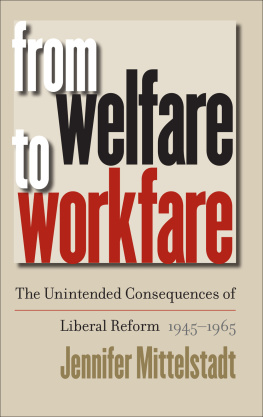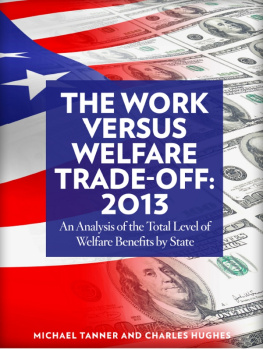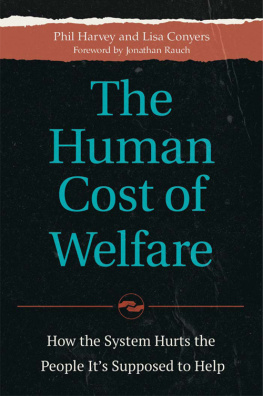
The Failed Welfare Revolution

The Failed Welfare Revolution
AMERICAS STRUGGLE OVER
GUARANTEED INCOME POLICY
Brian Steensland

Copyright 2008 by Princeton University Press
Published by Princeton University Press, 41 William Street, Princeton, New Jersey 08540
In the United Kingdom: Princeton University Press, 3 Market Place,
Woodstock, Oxfordshire OX20 1SY
All Rights Reserved
Library of Congress Cataloging-in-Publication Data
Steensland, Brian, date.
The failed welfare revolution : Americas struggle over guaranteed
income policy / Brian Steensland.
p. cm.
Includes bibliographical references and index.
ISBN-13: 978-0-691-12714-9 (hardcover : alk. paper)
1. Public welfareUnited States. 2. Guaranteed annual incomeUnited States. I. Title.
HV95.S72. 2008
362.582dc22 2007008734
British Library Cataloging-in-Publication Data is available
This book has been composed in Electra
Printed on acid-free paper.
press.princeton.edu
Printed in the United States of America
10 9 8 7 6 5 4 3 2 1

For Shana, with love and affection
Contents
INTRODUCTION
Understanding the Failed Welfare Revolution
CHAPTER ONE
The Rise of Guaranteed Annual Income
CHAPTER TWO
Guaranteed Annual Income Goes Public
CHAPTER THREE
The Origins and Transformation of the Nixon Plan
CHAPTER FOUR
Nixons Family Assistance Plan Stalls
CHAPTER FIVE
Defeat and Its Policy Legacy
CHAPTER SIX
Carter and the Program for Better Jobs and Income
CHAPTER SEVEN
Lost Opportunities, Consequences, and Lessons
CHAPTER EIGHT
Culture and Welfare Policy Development
Preface
The Failed Welfare Revolution is about the rise and fall of an ideathe idea that the government should provide basic economic security for all Americans. I began this project intending to study Americas changing views of poverty, inequality, and justice through the lens of debates over welfare reform legislation from the 1960s through the 1990s. In reading background materials, I ran across scattered references to guaranteed annual income plans. Though one such proposal nearly became law in the early 1970s, they received relatively scant coverage in the many books on American social welfare policy. The proposals captured my interest. Why had these proposals arisen and nearly passed into law? Why had the idea disappeared from the nations collective memory? Did the idea hold any promise for the future? Given my interest in how people make sense of poverty in an affluent society, the struggle over guaranteed income policy also attracted me because of the candor with which members of the policy community debated, albeit briefly, such issues as the nature of poverty, the goals of welfare reform, and our collective obligations to one another.
As I delved more deeply into policy histories, I ran across a number of surprises. Guaranteed annual income plans were the welfare reform strategy of the late 1960s and 1970s. Three presidential administrations considered them, and they served as the centerpiece of welfare reform proposals under both Nixon and Carter. The plans also enjoyed an unexpectedly broad range of support. Though it was scarcely surprising that liberals liked the plans, many conservatives did too. (For example, former president George H. W. Bush voted for Nixons plan as a Texas congressman and Donald Rumsfeld promoted it as the director of the Office of Economic Opportunity.) The politics of the plans also ran counter to a number of conventional expectations. Interest groups took unexpected positions on the plans; pressures from social movements mattered, but only to a point; elements of the American political system usually thought to obstruct policy innovation actually gave rise to such innovation; and government experts, whose role is often minimized in accounts of welfare policy development, turned out to play a highly significant role.
In reading through archival materials and media coverage from the era, I began to see that the cultural dimension of debates over guaranteed income plans could make sense of some of these puzzles and illuminate the failure of the plans. I realized that guaranteed income plans connoted a wide variety of meanings for different groups, and that there was frequently a contradiction between the substance and the symbolism of the plans (especially Nixons). I also realized that guaranteed income plans failed because they challenged the cultural logic of American welfare policy, which is based on sorting the poor into different programs according to assessments of their deservingness. In contrast, guaranteed income plans treated all the poor as deserving. These realizations came somewhat slowly to me because most existing scholarly perspectives on welfare state development lack the analytic tools to capture the significance of cultural factors such as the symbolic connotations of policy proposals or the moral boundaries policymakers reinforce through legislation. Therefore, the account in this book gives special consideration to cultural factors such as these while also showing their interrelationship with factors that are more typically emphasized in the welfare state literature, such as class struggle and institutional patterns of policymaking.
The importance of these cultural factors, I believe, goes well beyond debates among academics about the best ways to explain social policy development. The idea of providing basic economic security to all Americans (or even just American families) is not debated today, first and foremost, because it is unthinkable. It is currently beyond the pale of American political discourse. So too, of course, were other ideas once that we now hold dear, such as womens suffrage and equal rights for racial minorities. I invoke these comparisons not necessarily to cast positive light on guaranteed income policies by analogy, but to illustrate that the nature of the unthinkable changes. An idea is unthinkable when it does not fit with the dominant conceptual framework in society, a framework often bolstered by powerful groups and reinforced by institutional patterns.
The history the book recounts shows that American antipoverty policy is designed to stigmatize the poor who are deemed undeserving and mark them as morally different from the rest of society. This was part of the existing conceptual framework that guaranteed income plans challenged in the 1960s. Is this dominant conceptual framework valid? Are the poor really morally different from the rest of society? Is poverty their fault? Do they deserve to be stigmatized? Put positively, is providing economic security for the poor through government policy a worthwhile goal? These are questions that the nation has not debated for a generation. They are worthy of revisiting.
Acknowledging debts of gratitude is both one of the most enjoyable and most humbling parts of writing a book. I owe many people and institutions my thanks for their intellectual generosity, moral and financial support, and assistance in researching the project. I began this project as a graduate student at Princeton University, where Bob Wuthnow and Paul DiMaggio proved to be exemplary advisors, setting standards of generosity that I can only hope to approximate one day. Bob provided unstinting wisdom, intellectual guidance, and support throughout my graduate years, even as my research interests evolved considerably. Paul was a perpetual source of creative ideas, tough questions, and good humor. Frank Dobbin and Viviana Zelizer both gave me valuable feedback on the project at critical junctures, and I further benefited from conversations with Miguel Centeno, Michle Lamont, Sara McLanahan, Paul Starr, and Bruce Western. Though I benefited in countless ways from my formal education at Princeton, I learned just as much from the fellow students whom I met there. For their friendship, good cheer, and more than occasional brilliance, special thanks to Courtney Bender, Bethany Bryson, Julian Dierkes, John Evans, Marion Fourcade-Gourinchas, Eszter Hargittai, Kieran Healy, Cynthia Hooper, Jackie Gordon, Erin Kelly, Jason Kaufman, Becky Pettit, Tania Rands Lyon, Kimberly Morgan, Mike Moody, Lynn Robinson, Jeannie Sowers, Steven Tepper, Margaret Usdansky, Brad Wilcox, and Kathrina Zippel.
Next page








